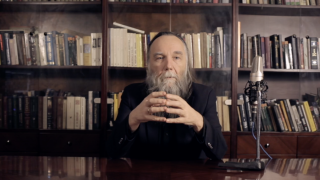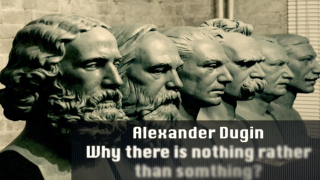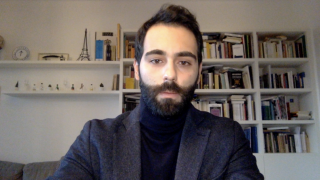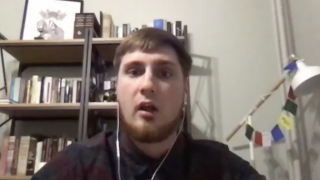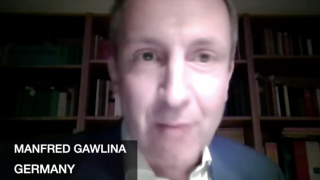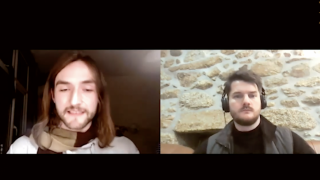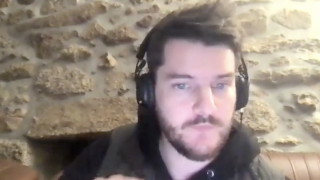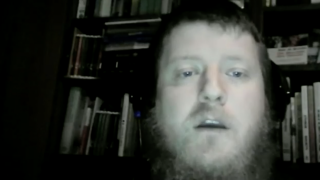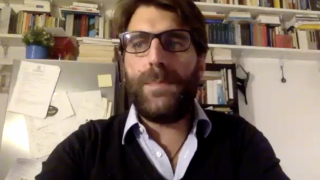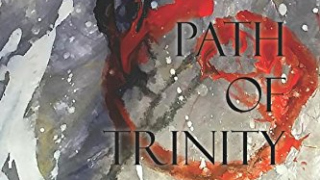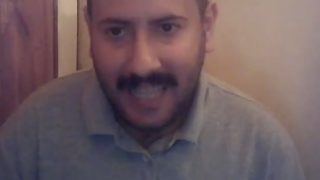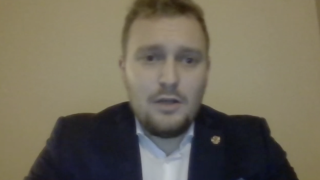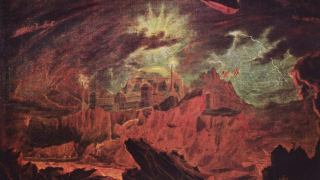Presentation by Travis Wade ZINN for the Philosophical conference “Wozu Philosophen in dürftiger Zeit?”
"Horizons of post-nihilism and spiritual renewal in the United States"
(Title slide - Uriel image)
Good evening. I want to extend my appreciation to professor Dugin for his invitation to participate in the conference today. The subject of my presentation is “horizons of post-nihilism and spiritual renewal in the United States.” Because of time constraints my presentation will be brief and will be, as we say in zen, “just a finger pointing at the moon.”
Concerning myself, as you might guess, I’m an American. I grew up in the heartland and have spent much of my adult life abroad, which includes living in Russia, the United Kingdom, the Netherlands and France. For me the south of France is home, but I currently live in East Tennessee. My academic background is in religion and my focus is on Christian mysticism.
Everyone here is almost certainly aware of the existential and metaphysical crisis that is ongoing in the United States at the moment. Predictive modelling coming from scholars such as Peter Turchin or Peter Zeihan correlates with what intuitives have been telling us from some time, which is that we’re in dark waters and are experiencing the return of history.
How we navigate 2021 and the next decade will be critical. In this context I should say that I am not affiliated with any political, governmental or religious organization and am also coming at these challenges from a meta spiritual perspective. I am at core hopeful about the future.
The transformations that are coming will be difficult but will also present an incredible opportunity for spiritual renewal in our time, and so this will be the focus of my talk.
The painting on the right is of Archangel Uriel.
(1st slide - Nietzsche photo, Archons)
For purpose this talk I will be defining nihilism generally as ontological homelessness that involves the collapse of personal or collective meaning. Post-nihilism by contrast involves a spiritual coming home and renewal or new shared meanings for the individual or society.
Nihilism takes many forms but when it becomes embodied in the collective unconscious of a nation it often looks like what we are experiencing in America today, namely chaos in the information ecology, collapse of shared narratives, and a will-to destruction.
What Nietzsche’s madman in Zarathustra predicted has finally arrived, that is to say the lived death of God as collective reality, but it's been so amorphous we’ve hardly noticed, at least until now. Its full-blown consequences are on dramatic display in America and playing out as we speak.
When a civilization produces archetypal figures that mirror it and are its shadow and when perennial patterns produce in the collective psyche, modern man is at a loss to know how to respond. However, the Ancients would have seen this to be the work of Archons. Saint Paul in Galatians referred to them as Thrones and Powers and Dominations. For the ancients world rulers were, if not gods themselves, simulacrums of otherworldly spiritual activity directly relating to our own.
Therefore, in response to the challenge this conference puts forth, “what are philosophers for in a destitute time?” I would argue that philosophers must now become spiritual scientists. They must accept their responsibility for the sacricide of the gods and take action and care.
The gods have returned, and their arrival is transforming civilization as we know it.
(2nd slide - 4 photos family / religion / Ava)
Civilizations like individuals often require upsets for awakenings, and this is also true for spiritual communities. It is time we started taking spiritual reality for what it actually is ---our utmost concern, and only when we begin to do this will we see spiritual renewal and true transformation.
Spiritual renewal in the United States in the wake of postmodernism is possible in part because American spirituality is pragmatic and results oriented, with a focus on embodied philosophy and applied theology. American has many deep spiritual traditions and time does not permit me to look at all of them; however, I might mention in passing the Quaker tradition and the American transcendental tradition that was seeded by Ralph Waldo Emerson, a Unitarian minister and luminary.
Pictured above left is the National Campground here where I live in Greenback Tennessee, which was founded in the wake of the Civil war. These campgrounds used to be dispersed across the United States and held annual revival meetings. They were founded during periods known at the Great Awakenings, a series of national spiritual renewals beginning in the 18th century and carrying through until the 20th century.
My great grandfather, Albert Allen Ketchum, is pictured on the lower left and was for a time a travelling evangelist and songwriter who preached at similar campgrounds. His hymns and songs are held in the national archives, and our family was part of the Conservative Holiness movement, which is an offshoot of Methodism.
Holiness Christians have a focus on purifying spiritual progression that is resonate with Christian Orthodoxy’s paths of purification, illumination, and theosis but they instead use the terms, “salvation, sanctification, and entire sanctification.” As I share in my book, I feel that the revitalization of Christianity across traditions requires that we relearn similar practices and focus on related disciplines, such as prayer and meditation.
During a later part of my childhood my family moved to the Ozarks of Southern Missouri, deep in the American heartland. Winter’s Bone, a movie that has received international acclaim, was set and filmed just a few miles from my home. I mention this film because it illustrates some of the challenges of inequality and cultural dissonance within the country, and also highlights the need for widespread spiritual renewal.
(3rd slide - Baudrillard America - Joel Olsteen church)
The decline of traditional American spirituality reached an accelerating pace by the mid-1980s, during the time Baudrillard wrote his sometimes infuriating but predictive travelogue on an America's most glaring faults. The 70s had seeded a spiritual reformation that would only be possible through the cultural deconstruction which, in a terrible twist of irony, Christians would bring upon themselves. Today’s spiritual landscape is the result. Evangelical Christianty is projecting its shadow upon the nation and becoming its doppelganger other.
Naturally this did not happen overnight. Walmart came to my small town of Ava Missouri in the 1970’s but it was not until the 1980’s that the shops on the local square closed and there was no longer a drug store with an ice cream counter. Carl Marx rightly observed that capitalism would be an excellent tool for deconstructing cultural and religious norms, which would pave the way to communism. While American Christians were enthusiastically embracing the prosperity gospel a neoliberal plutonomy was devouring America.
Time that for one generation allowed a life of prayer would be soon allocated to Hollywood divertissement on television, and eventually to social media. Hyperreality became standard fare even in far-flung parts of the countryside. Baudrillard’s vision was finally coming into focus with reality TV, which eventually gave us our first postmodern president and an information ecology so profoundly damaged that sensemaking has become impossible for almost everyone.
While fundamentalist Christians are embracing bizarre conspiracy theories like Quanon, the exponentially rising number of Americans who identify as spiritual but not religious look on with revolt. Mainstream churches who attempt to hold a middle ground on the other hand are also observed with disinterest. What do churches have to offer if they merely mirror popular culture?
What is left to offer the world if only the exoteric shell of Christianity’s esoteric inner life remains? How do we get out of this mess and is radical reform of Christianity even possible?
(4th slide - Kyoto and Heidegger)
To begin to answer this question I suggest we look toward Japan.
In the 20th century great thinkers of the West have had fruitful encounters with Japanese thought and practice, and here I would mention here in passing Martin Heidegger, who is reported to have said to a friend concerning the great Zen scholar DT Suzuki, ‘If I
understand this man correctly, this is what I have been trying to say in all my writings.”
The Kyoto school of philosophy is an excellent example of this dialogue, a notable instance of this being Nishitani’s book, Religion and Nothingness, which is pictured here on the right. Suzuki for his part was also interested in western spirituality and even wrote a book on the 17th century Protestant mystic, Emmanuel Swedenborg, called Buddha of the North.
More importantly. there was cross-fertilization between actual practice and traditions. From my early spiritual tradition, the Holiness tradition, came missionaries to Japan such as Charles and Lettie Cowman, from the One Mission Society, this while Japanese Zen was also making its way to American shores by the end of the 19th century.
During and after the post war years important Catholic missionaries were encountering and embracing Zen meditation practice, notably Father Thomas Hand from America, and Father Hugo Lassalle from Germany, both of whom became Zen teachers in their respective countries.
Their focus was the same as mine, namely “results.”
I would, therefore, argue that we must embrace spiritual disciplines that produce inner depth and mindfulness immediately. Meditation disciplines are as important as prayer and are an essential tool for personal transformation and Christian reformation. Already there are numerous Christian Zen groups around the world.
(5th slide - Zendo and Zen books)
Why, you might ask, is Zen meditation uniquely important?
This true Self is known by many names, and in this conference it is being called “the radical subject,” but you could also call it “the seat of the soul.” What you call it is unimportant, what is important is that you be it. Zen gets you there samurai style, with no bullshit. It does this directly and quickly, “what is the sound of one hand clapping?”
Zen practice is to the person what postmodernism is to a culture, and this is very important to note for the purposes of my talk. Zen meditation strips away all the unnecessary artifacts and reveals what is ultimate and essential. I will later discuss how this process is crucial for the reformation and renewal of both Christianity and Western Civilization.
Zen strips you down to the inner self and it is only from here that you can live the Spirit-filled life. Zen practice peels away the false ego constructs, the dysfunctional cultural and religious frameworks, and all that binds you falls away. This is where it all becomes real, where your true self is revealed and authentic relationship with God is possible.
I recommend the two books on the right because the first one is very practical and the second one takes you to the next level, although that concept would be mostly meaningless in Zen.
I lived at the above monastery for almost 6 months.
(6th slide - Nietzsche and Zen books)
Some Christians will recoil at the antinomian nature of Zen, that is to say the disruption of firmly-held moral values and beliefs. This is a genuine concern which should be acknowledged and, even in the brief context of this presentation, highlighted. The topic may seem irrelevant but will be crucially important to consider, as we will see later.
American culture is fiercely individualistic which has had both positive and negative sociological implications. What I think can be fairly said is that we are fundamentally out of balance, which is a critique leveled by our European neighbors and also by our friends in the East. As we saw earlier, there is a corollary between postmodernism’s impact on collective meaning structures and Zen’s deconstruction of the false self. The first can result in an individual who is untethered from the moral collective and stuck in materiality, the second in its spiritual equivalent.
This kind of problem often occurs in deep spiritual practice, in the microcosm of the individual. Zen meditation or the kinds of breathing methods and yogic postures used by Christian Orthodox monks can result in a problem called “inflation,” in spiritual empowerment out of harmony.I look at this topic in some detail in my book but, in brief, there is a good reason that Buddhist and Christian monks take moral vows before entering into deep practice.
We as philosophers should do the same. As spiritual scientists we are responsible for what we bring into the world and I will look at what it means to be an AntiChrist presently.
(7th slide - Icon and HT)
One the bottom left is an icon that is a depiction of me and my little dog, Jack. When I was living in Nice France I had a traumatic brain injury and after an extended hospital stay relocated up to Vence, a perched village on the French Riviera. Because I was disabled I was given a job working at a handicapped jobcentre trimming olive trees, which is where I met the friend who did this painting.
I give this story to illustrate a point, which is something every one of us should never forget. It can be summed up most simply in the statement, “we’re all in this together.” My friend, who was also handicapped, pictured herself in the lower right hand corner as an angel. We are all angels to each other, and this extends beyond the immediate and into the spirit realm.
It also extends into our deep history. Our spiritual ancestors are there and want to give us the keys to renewal, but we have to first awaken to experience and actualize them. They seeded our civilization with the knowledge that created it, and renewal is our collective responsibility. What GK Chesterton called “the tyranny of the living” must be overcome.
(8th slide - Music of Spheres and Peter Kingsley books)
Above center is an image of the musica universalis, or music of the spheres, which represents the ancient concept of a harmony that pervades the universe. Today’s religious movements often trivialize it’s meaning with a language of “oneness” that rarely hits the mark of expressing the diversity we must embrace as part of the whole, and which is essential to renewal.
One of the most important thinkers to bring about this understanding is Peter Kingsley. His combination of erudite scholarship and personal experience is precisely the kind of molotov cocktail that makes academia set up and take notice. His book A Story Waiting to Pierce You: Mongolia, Tibet, and the Destiny of the Western World is an important book for our times, as is his subsequent book, Catafalque, which similarly highlights the urgent crisis.
Western Civilization is indeed in crisis and new solutions cannot be divorced from the old, and will never hit the mark if we do not honor our ancestors. New truths must also embrace our heritage to be actualizable. The true man of the future, therefore, will be one inextricably wed to the past and it is only from this starting point that true transformation can begin.
True transformation is also shown in proofs. Spirituality is at its best when it is both useful and demonstratively true. During this Christmas season we often hear the story of the wise men who found Christ. We mustn’t forget that these were Persian Maji who understood the music of the spheres. What happened to this spiritual technology? Can it be revived again?
(9th slide - Sphinx and Tower of Babel)
I think it’s safe to say that there isn’t anyone at this conference who is unfamiliar with the objectives of transhumanism, with the gene-editing technology and artificial intelligence developments that are leading us to what futurists call the “singularity.” If there is one thing that is clear to all of us here it is that now is absolutely not the time for the faint of heart.
Some of you hope to accelerate the end of this historical cycle, but I would like to invite you to think along with me about how we might transcend it instead. We are about to take a great leap forward that will either result in the end times as envisioned by apocalyptic thinkers, or in a much better world. That choice is up to us, and it is an enormous responsibility.
Some of you might entertain that multipolarity can be an effective solution, and while this may occur, I feel we must remain focused on unity of human development. For those who would disagree I invite you to watch The Hunger Games. In the world depicted in this movie an advanced civilization toys with contained and so-called primitive civilizations by means of technology. This kind of outcome is not desirable, either coming from America, Russia or elsewhere. Nobody wants to be trapped.
We’re all in this together and we have to do our best to make this work. Humans always do their best when they are free and pull together. Diverse concepts of freedom should of course be acknowledged --and we are doing that here-- but our focus ultimately has to be on how to transform collective consciousness before transhumanist outcomes surpass our spiritual and moral development. We must act immediately if we are to resist the coming technological simaraculum of true spirituality.
Current modelling in physics indicates that consciousness is the fundamental building block of reality, something that when applied will revolutionize our understanding of ourselves and the world. If “all we ever see or seem is but a dream within a dream,” to use the language of Edgar Allen Poe, then how are we to dream? How do we integrate this incredible potentiality?
I began this talk by mentioning the return of the gods and some of you might have thought that this was a metaphor --and to the extent that I am referring to archetypes it is-- but in important respects it also is not. I promised I would come back to the topic of the Antichrist, and so will do so now. The answer lies in the riddle of the Sphinx.
What goes on four feet in the morning, two feet at noon, and three feet in the evening? The known answer is man: as a baby he crawls, as an adult he walks, and in old age he uses a cane. The correct response however, is not ages of man but ages of mankind.
The Sphinx’s riddle tells us both our past and our future. She has the body of an animal, the head of the man, and the headress of a god. We likewise are body, soul and Spirit. The Sphinx has risen from the sand and we are now in the high jeopardy of the Paraclete age.
Will we become Spirit or Simulacrum, a Christ or an Antichrist?
(10th slide - Hurtak Pistis Sophia and Mary image)
What is the antidote to the Dark Logos of our time, and what is the Antidote to the Antichrist?
Wisdom buildeth her house. Throughout the ages she has forever been self-surpassing, and we must be the same. The antidote to lower truths is higher truths. The antidote to imperfect wisdom is higher wisdom. If we refuse to renew our minds and surpass our times we will become the artifacts the world leaves behind.
The knight of the soul must be willing to go beyond, and for humanity the time has now come to take off the training wheels, and embrace the beautiful diversity of intelligences in the Universe. We must ascend to new heights. Is this fraught with spiritual dangers? Absolutely, and many will fall. However, our choice is forced and the time is now.
Will we be Christied Saints or Antichrists? Will we survive or be destroyed? The tools are the same and the stakes could not be higher. Cultural religion without spiritual technology is no longer functional and so our faith requires progressive traditionalism. We must accept and use spiritual technologies, or we will be relegated to the transhumanist museum of quaint oddities.
Put succinctly, we must embrace self-transcending frameworks that reform and renew the old.
It is imperative that we renew our minds and our traditions and we must take action now.
(11th slide - my book)
The truths I have brought you today comes from a poisoned chalice of suffering, and for this I apologise to the Archons and choose to ascend. As philosophers, as spiritual scientists, our task is both hard and pressing, and we must be courageous.
To those who have attended today I would like to offer you my book as a gift. It is available in print at booksellers but I am making an electronic copy available to conference participants for free, just click on the embedded hyperlink to request a copy.
At the end of my book I make a proposal for global meditation training centers for Christians. This is a concrete project for training leaders who can guide our communities. Should the time come for Christians to again live together as did the early church we will need exactly this.
Thank you for your time, and again, special thanks to Professor Dugin for inviting me today.



